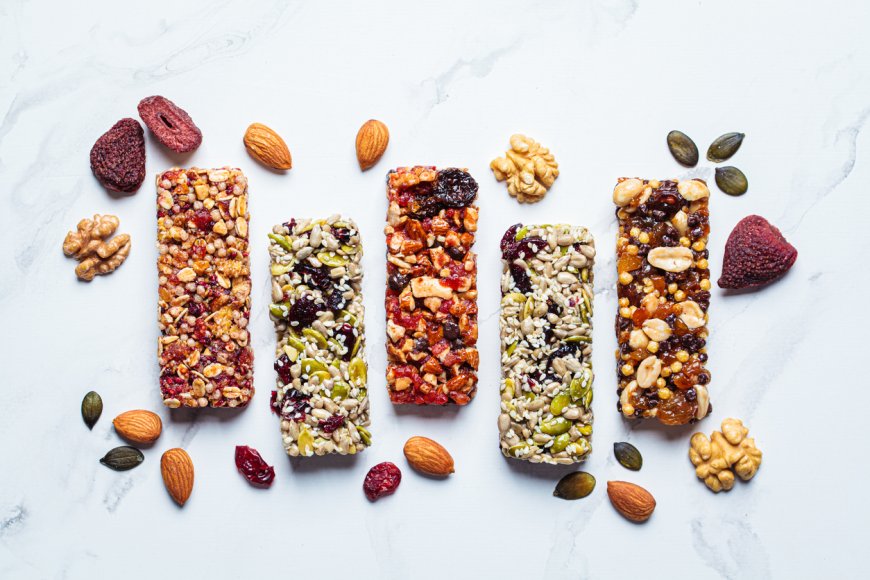What is protein bar?
A protein bar is a nutritional supplement that comes in a variety of flavors and sizes and is designed to provide a convenient source of dietary protein and other nutrients. Typically, these bars are dense in nutrients and are used by individuals who need a quick and portable source of protein and energy. They often contain a significant amount of protein from sources such as whey, soy, or plant-based proteins, and may also include carbohydrates, fats, vitamins, and minerals to support overall health. Protein bars are commonly used by athletes, fitness enthusiasts, and people looking for a healthy snack or meal replacement option. They are especially popular among those looking to increase their protein intake, manage their weight, or sustain their energy levels throughout the day.
Protein Punch: Bite into Nutrition with Every Bar
Protein Content:
- Amount: Protein bars typically contain between 10 to 30 grams of protein. The exact amount should align with the consumer's dietary needs. For instance, individuals who are very active or trying to build muscle might look for bars with higher protein content.
Types of Protein:
- Whey Protein: Derived from milk, whey protein is quickly absorbed by the body, making it popular among athletes for post-workout recovery. It contains all essential amino acids.
- Soy Protein: A complete plant-based protein containing all essential amino acids. It's a good option for vegetarians and those who are lactose intolerant.
- Pea Protein: Another plant-based option that's gaining popularity. It's hypoallergenic and a good fit for those with dietary restrictions.
- Casein: Also derived from milk, casein is digested slowly, providing a steady release of amino acids over time. It's often taken before bed for a sustained protein supply.
Balance of Other Nutrients:
- Carbohydrates: The carb content can vary widely. Active individuals might prefer higher carb content for energy, while others might look for low-carb options. The type of carbohydrate (complex vs. simple) also matters for sustained energy and blood sugar management.
- Fats: Healthy fats are crucial for overall health and can also make the bar more satisfying. Look for bars with unsaturated fats from sources like nuts and seeds.
- Fiber: Often overlooked, fiber is vital for digestive health and can help provide a feeling of fullness, aiding in weight management.
Low-Sugar Options:
- Many protein bars are designed to be low in sugar to appeal to those watching their sugar intake for health or dietary reasons. Look for bars sweetened with natural sweeteners like stevia, erythritol, or xylitol.
Added Vitamins and Minerals:
- Some protein bars are fortified with additional vitamins and minerals to enhance their nutritional profile. This can include calcium for bone health, iron for blood health, or B-vitamins for energy metabolism.
Nutritional Takeaways:
- For Weight Management: Look for bars with higher protein and fiber but lower in calories and sugar to help with satiety and weight control.
- For Energy and Recovery: Those needing a quick energy boost or post-workout recovery might prefer bars with a balanced mix of proteins and carbohydrates.
- For General Health: A bar with a good balance of protein, healthy fats, fiber, and essential vitamins and minerals can serve as a nutritious snack.
Taste and Texture
When discussing the taste and texture of protein bars, these are two crucial aspects that greatly influence consumer satisfaction and the likelihood of repeat purchases. Here's an expanded look at these factors:
Taste: Flavor Profiles
- Classic Flavors: These might include chocolate, vanilla, strawberry, or peanut butter. They are often favored for their familiarity and wide appeal.
- Fruit Flavors: Options like lemon zest, berry, apple cinnamon, or tropical fruits. These are usually preferred by those who like a tangy or refreshing taste.
- Dessert-Inspired: Flavors mimicking desserts like brownies, cookies and cream, or caramel fudge can make protein bars feel like a treat while still providing nutritional value.
- Savory Options: Some bars might offer less common, savory flavors like Thai chili or BBQ for those who don't have a sweet tooth.
- Herbs and Spices: Incorporation of cinnamon, mint, ginger, or turmeric can add a unique twist and depth to the flavor.
Texture: Sensory Experience
- Chewy: Many protein bars are chewy, providing a satisfying and substantial mouthfeel. They may be dense and moist, often due to ingredients like dates, honey, or syrups.
- Crunchy: Bars with nuts, seeds, or crisped rice can offer a crunchy texture. This can be appealing for those who enjoy a bit of bite in their snacks.
- Soft and Smooth: Some bars are designed to be soft and easy to eat, almost like a thick mousse or fudge. They might be preferred by those who don't want something too dense or chewy.
- Layered Textures: A combination of textures, such as a crunchy base with a soft topping, can make the eating experience more interesting and enjoyable.
Factors Influencing Taste and Texture:
- Ingredients: The type and quality of ingredients greatly affect taste and texture. For instance, the type of protein used (whey, soy, pea) can influence the flavor and mouthfeel.
- Sweeteners: The choice of sweetener (sugar, honey, stevia, sugar alcohols) not only affects the sweetness level but also the aftertaste and overall mouthfeel.
- Add-ins: Ingredients like nuts, seeds, chocolate chips, or dried fruits can introduce additional flavor and textural elements.
- Processing: The way a bar is processed (baked, raw, extruded) can also impact its texture and taste.
Why Taste and Texture Matter:
- Enjoyment: The more enjoyable the taste and texture, the more likely consumers are to incorporate these bars regularly into their diet.
- Satiety: A satisfying texture can make a bar more filling and fulfilling, helping to curb hunger and provide sustained energy.
- Variety: A wide range of flavors and textures can prevent palate fatigue and keep consumers interested in the product line.
When discussing the scientific backing of protein bars, it's essential to examine the claims often made about their benefits and the research supporting these assertions. Here's an expanded look at this aspect:
Common Claims Made About Protein Bars:
- Muscle Building and Repair: Many protein bars claim to support muscle growth and repair, particularly when consumed after exercise.
- Weight Management: Some bars are marketed as tools to help with weight loss or maintenance due to their ability to promote satiety and provide controlled portions.
- Energy Boost: Many protein bars claim to provide sustained energy, making them ideal for busy individuals or those needing a pre- or post-workout snack.
- Meal Replacement: Some bars are positioned as convenient meal replacements, offering a balanced profile of nutrients.
Scientific Backing:
-
Muscle Building and Repair:
- Research: Studies have consistently shown that protein intake post-workout can aid in muscle recovery and growth due to its role in muscle protein synthesis. The type of protein (whey, casein, soy, etc.) can have varying effects on the rate of synthesis and recovery.
- Expert Opinion: Nutritionists and sports scientists often recommend a source of protein after strenuous activity to aid in recovery. Protein bars can be an effective solution when whole food isn't available or practical.
-
Weight Management:
- Research: Dietary protein can increase satiety and reduce subsequent eating, according to multiple studies. Protein bars with high fiber content can also contribute to fullness and help in weight control.
- Expert Opinion: Dietitians might recommend protein bars as part of a structured dietary plan for weight management, recognizing their convenience and controlled portion sizes.
-
Energy Boost:
- Research: Carbohydrates are the body's primary energy source, and many protein bars also contain a significant amount of carbs. The combination of carbs and protein can provide a sustained energy release, unlike the quick spike and crash associated with high-sugar snacks.
- Expert Opinion: Health experts may suggest protein bars with a balanced mix of proteins, fats, and carbohydrates as a suitable snack for energy sustenance.
-
Meal Replacement:
- Research: Some protein bars are designed to provide a balanced nutritional profile with an appropriate mix of macronutrients, fiber, vitamins, and minerals, mimicking a small meal.
- Expert Opinion: While most experts agree that whole foods are the best option for meals, many acknowledge that a well-formulated protein bar can serve as an occasional substitute when needed.
Evaluating Claims:
- Read Labels Carefully: Check for the specific nutrients and their quantities. Compare them against daily recommended values to understand the bar's true nutritional contribution.
- Understand the Context: The benefits of protein bars can vary greatly depending on an individual's overall diet, activity level, and health goals. What works for one person might not work for another.
- Look for Peer-Reviewed Studies: When a product cites a study, look for peer-reviewed research to ensure it's credible and not just marketing hype.
- Consult Health Professionals: Dietitians, nutritionists, and medical professionals can provide guidance on whether a protein bar is suitable for your needs and how to incorporate it into a balanced diet.
Final Thoughts:
While there is scientific backing for many of the claims made about protein bars, it's important to approach them as part of an overall balanced diet. They are not magic bullets but can be convenient and effective when used appropriately. Understanding the research and seeking expert advice can help you make informed decisions about whether and how to incorporate protein bars into your diet.














































































































